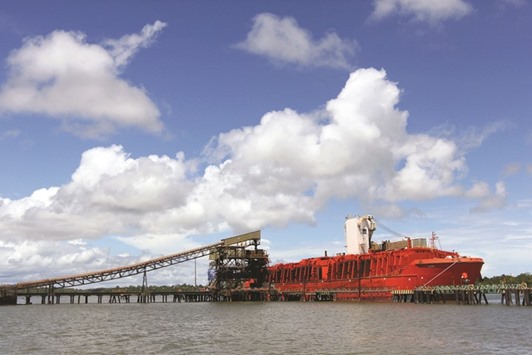Indonesia will continue to allow mining companies to ship concentrates overseas after January 11, abstaining from a proposed ban that Freeport-McMoRan said threatened operations at the world’s second-largest copper mine.
A moratorium on unprocessed ore shipments remains in place, Energy and Mineral Resources Minister Ignasius Jonan told reporters in Jakarta yesterday. Companies will be permitted to keep exporting concentrates as long as they comply with various rules, including converting their contract of work into a special mining business licence, he said.
The decision still needs approval from President Joko Widodo, he added. Richard Adkerson, chief executive officer of Freeport, the world’s biggest publicly traded copper miner and owner of the massive Grasberg mine in Papua province, said this month that without a resolution it would have to cut back operations and curb development at the mine.
A ban was in prospect as officials in the resource-rich nation scrambled to revise regulations so companies that had committed to build smelters could continue to export concentrates, an intermediate product used to make copper, after the January deadline.
“The previous rule states that contract of work holders are not allowed to export concentrate after this year, so converting the contract of work into a special mining business license is the most possible solution,” Coordinating Minister of Economic Affairs Darmin Nasution said. Shipments are subject to export taxes, he told reporters.
Companies must commit to build smelters within five years and submit progress reports every year, Nasution said. “If for example, they don’t show any progress, exports can be stopped in the first year,” he said.
Indonesia, Southeast Asia’s largest economy, banned exports of raw, unprocessed ores in January 2014 as it sought to develop a processing industry and prevent its mineral wealth from disappearing overseas. While the rules allowed time for producers to build smelters, the government said shipments of semi-processed ores or concentrates would not be permitted after three years.
The government will now allow mining companies to seek an extension to their contract of work five years before expiry, but they will have to convert it to a special mining business license, Jonan said. Currently miners can seek an extension only two years before the contract expires. Freeport welcomes the decision and is ready to work closely with the government, Riza Pratama, a spokesman at unit PT Freeport Indonesia, said by text. Adkerson said this month the company was seeking clarity on conditions that will permit it to operate in the country beyond 2021. While he called building a smelter “hugely uneconomic,” he said the company was prepared to do it, but couldn’t start spending the money until its contract was extended.

Copper-gold concentrate from Freeport McMoRan’s Grasberg copper and gold mine is loaded onto a ship at the company’s loading facility in the port of Amamapare, Papua province. Companies will be permitted to keep exporting concentrates as long as they comply with various rules, including converting their contract of work into a special mining business licence, Energy and Mineral Resources Minister Ignasius Jonan told reporters in Jakarta yesterday. The decision still needs approval from President Joko Widodo, he added.
